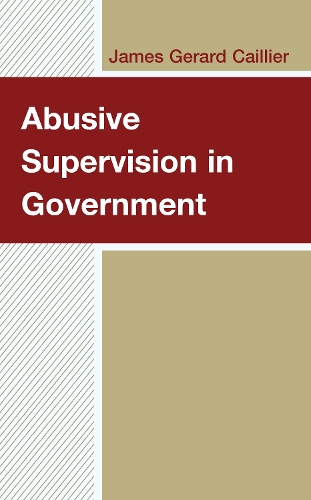
Abusive Supervision in Government
(Hardback)
Publishing Details
Abusive Supervision in Government
By (Author) James Gerard Caillier
Bloomsbury Publishing PLC
Lexington Books
27th August 2021
United States
Classifications
Professional and Scholarly
Non Fiction
Trade unions
Personnel and human resources management
Public administration / Public policy
658.382
Physical Properties
Hardback
148
Width 160mm, Height 228mm, Spine 18mm
413g
Description
In Abusive Supervision in Government Agencies, Caillier uses both quantitative and qualitative survey data, a mixed-method approach, to argue that certain organizational norms and subordinate factors either increase or decrease the presence of abusive supervision in agencies and that when employees experience abusive supervision, their well-being and work attitudes are adversely affected. In addition, a mixed-method approach is used to contend that problems concerning the abusive supervision process are pervasive in agencies. More specifically, many targets of abuse supervision fail to report the incident, and for those who do, agencies seldom do anything to stop abusive supervisors and the overwhelming majority of targets experience some form of retaliation for reporting the abuse. The author also uses qualitative data to argue that many agencies still do not have a robust workplace aggression policy. The author concludes by identifying future directions for research concerning abusive supervision.
Reviews
"This is a most timely publication! Though the media, and action groups like the Me-Too Movement, examples of abusive supervision at the highest levels of federal, state, and local government have come to light. With no organizational policy in place or complete understanding in human resource departments or active training for supervisors, employee complaints go unnoticed, unrecognized, and dismissed, leaving the victim alone to fend off the attacks or leave the organization. If left unchecked, turnover increases and the organization and its mission suffer. James G. Caillier brings much needed clarity to definition of abusive supervision, suggests possible corrective actions and exposes the implications for turning a blind eye to the need for change."
--Cynthia E. Lynch, Hawaii Pacific UniversityAuthor Bio
James Gerard Caillier is professor of political science at the University of Alabama.
